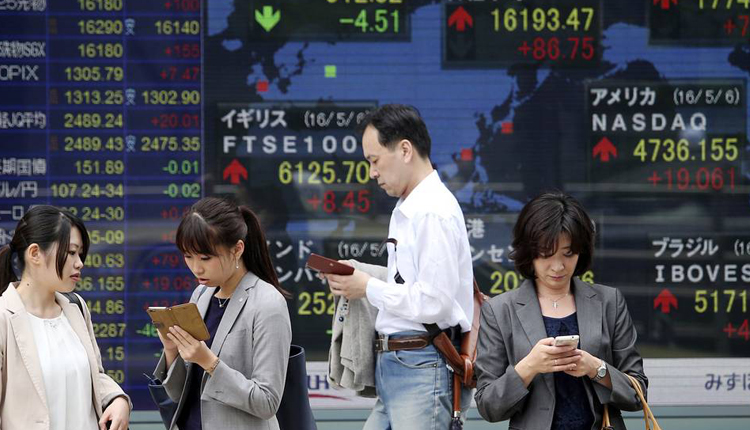Asian stocks traded lower Wednesday afternoon as investors watched for developments in the United States after lawmakers launched an impeachment inquiry into President Donald Trump.
Mainland Chinese stocks slipped by the afternoon, with the Shanghai composite down 0.57 percent and Shenzhen component declining 1.17 percent. The Shenzhen composite shed 1.214 percent. Hong Kong’s Hang Seng index also fell 0.95 percent.
In Japan, the Nikkei 225 slipped 0.44 percent as shares of index heavyweights Softbank Group and Fanuc fell 2.58 percent and 2.59 percent, respectively. The Topix index also declined 0.27 percent.
Over in South Korea, the Kospi shed 0.74 percent. Australia’s S&P/ASX 200 also declined 0.36 percent.
The MSCI Asia ex-Japan index traded 0.74 percent lower.
U.S. House Speaker Nancy Pelosi announced the inquiry after meeting with key leaders in the House committee and the Democratic leadership team.
Tuesday’s announcement came after reports about a phone call earlier this year between Trump and Ukraine’s leader, Volodymyr Zelensky. The U.S. president allegedly pressured Zelensky to investigate Democratic presidential hopeful Joe Biden’s family. Trump said on Tuesday he would release the full transcript of the controversial call.
Just three American presidents before Trump have faced serious impeachment proceedings, but Congress has never booted one from the White House. Even if Democrats eventually impeach Trump, the Republican-held Senate may never find him guilty and remove him from office.
The move also triggered a sell-off in U.S. equities overnight: The S&P 500 saw its largest one-day drop since August 23, falling 0.8 percent to close at 2,966.60.
The Nasdaq Composite also had its worst day in a month, ending its trading day lower by 1.5% at 7,993.63. The Dow Jones Industrial Average closed 142.22 points at 26,807.77.
As of Wednesday morning stateside, futures pointed to a muted open for stocks on Wall Street at Wednesday’s open.
The U.S. dollar index, which tracks the greenback against a basket of its peers, was last at 98.504 after slipping from levels around 98.700 yesterday.
On the trade front, Trump said Tuesday that he will not accept a bad deal with Beijing, ahead of negotiations between the two largest economies of the world set to take place in the coming weeks.
Chinese Foreign Minister and State Councilor Wang Yi responded to Trump’s criticism and said the two economic powerhouses should cooperate for mutual gain as well the rest of the world.
“I would like to see a trade deal but I’m very skeptical despite the macro backdrop in China which is very, very soft,” Sam Le Cornu, CEO and co-founder of Stonehorn Global Partners, told CNBC’s “Squawk Box” on Wednesday.
“At the moment it’s one of the most difficult periods, I think, to … try to predict in terms of where markets (are) going,” Le Cornu said.
The U.S. and China since last year have applied tariffs on billions of dollars worth of each other’s goods, which has roiled global markets, created uncertainty and dampened economic growth outlooks around the world.
Meanwhile, the Reserve Bank of New Zealand kept its cash rate on hold at 1 percent, following a larger-than-expected rate cut in August. In a media release, the New Zealand central bank said “there remains scope for more fiscal and monetary stimulus” if necessary.
The Bank of Thailand is also expected to announce its interest rate decision later on Wednesday.
Currencies and oil
The Japanese yen, often viewed as a safe-haven currency in times of uncertainty, traded at 107.30 against the dollar after strengthening from levels above 107.5 in the previous session.
The Australian dollar was at $0.6787 after seeing an earlier high of $0.6804.
Oil prices declined Wednesday afternoon during Asian trading hours, with international benchmark Brent crude futures slipping 0.71 percent to $62.65 per barrel. The U.S. crude futures contract also shed 0.58 percent to $56.96 per barrel.
Source: CNBC


